A wonderful research filled day with lots of talent
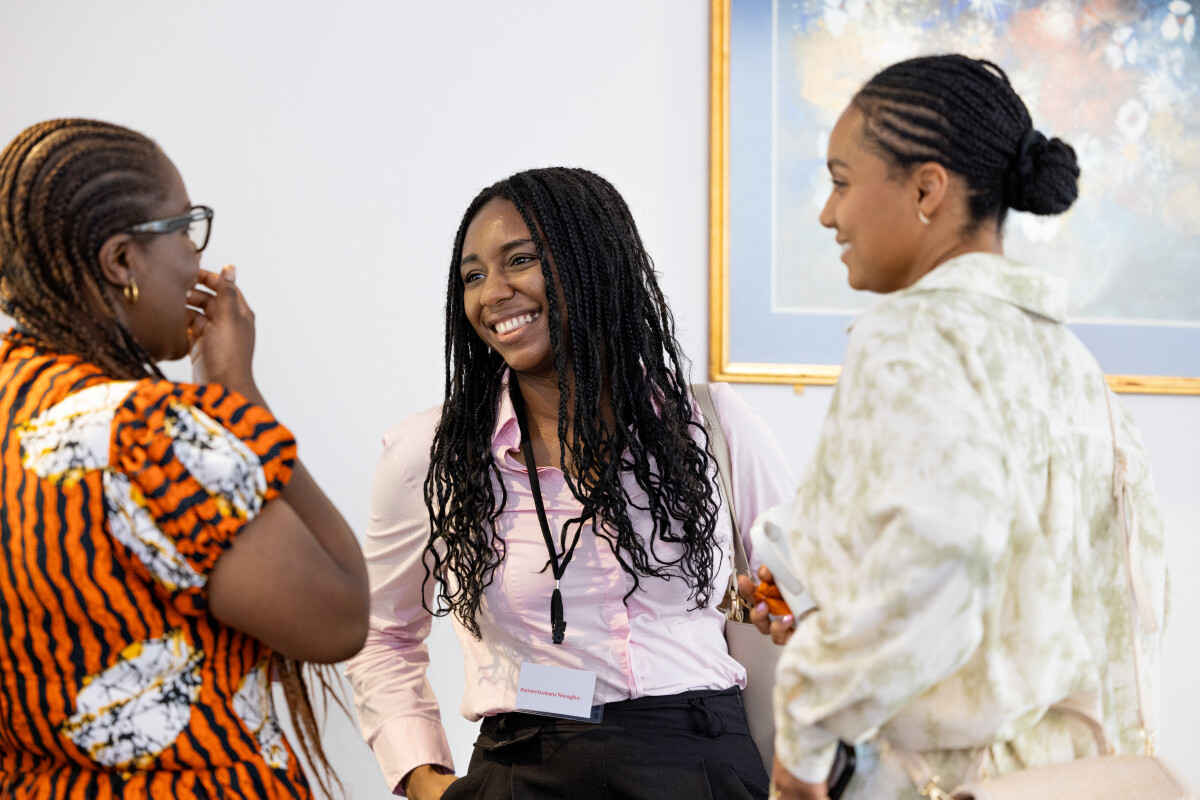
Postgraduate Research Symposium
by Corinna Alberg
Programme Manager, Cambridge-Africa
On the 30th June, one of the hottest days of the year, we gathered at Hughes Hall College, Cambridge, to celebrate the wonderful research being undertaken by African postgraduate scholars at Cambridge University. This event was organised by Cambridge-Africa and the African Society of Cambridge University (ASCU). We had a fantastic response to the call for abstracts to present research talks and flash talks. Scholars in the final stages of the PhDs described their research in the research talks sessions with masters scholars and those in the early stages of their PhD presenting flash talks.
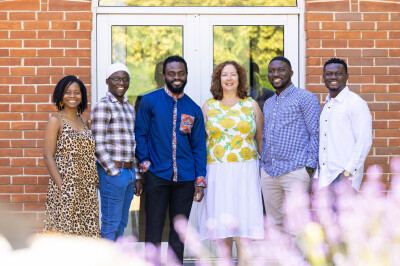
The Organising Committee of the Postgraduate Research Symposium
Professor Caroline Trotter, Director of Cambridge-Africa, welcomed all to the event and then the proceedings started with a keynote speech from Dr ThankGod Ebenezer, who after completing his PhD at Cambridge University, works at the European Bioinformatics Institute as the Global Engagement Manager. ThankGod’s presentation was on Africa in the age of digital innovation and he described the organisation he co-chairs, the African BioGenome Project, which is a coordinated pan-african effort to build capacity and infrastructure to generate, analyse and deploy genomic data to support biodiversity and agriculture in Africa. From there we took a deep dive into the research being done by African scholars in Cambridge. Jesse Rop focused on malaria transmission and the insights from mapping the stages of development of malaria parasites. He highlighted the value brought by the single cell approach. His analogy of this being like gaining insight on a fruit from a single piece of fruit compared to a smoothie brought his research vividly to life.
The spotlight then turned to Onyeka Awunor who is tackling the very important area of antimicrobial resistance and how research on membrane transporters can contribute to our approach to this huge challenge. The next talk was on root-knot nematodes – the most prevalent plant pathogen in the world and Junior Lusu Kika enlightened us on the huge impact they have on agricultural yields, reducing yields by up to 10%. They cause annual losses of $157 billion and so Kika is contributing to much needed research.
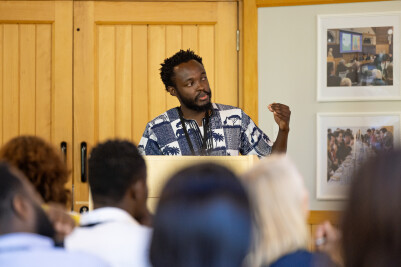
Jesse Rop presenting his research on malaria
After the research talks we were treated to a series of flash talks on wheat genetics, how to mitigate health-damaging sleep loss caused by high ambient temperatures with ‘living walls’– a topic that everyone present could empathise with over this hot summer. Rising temperatures globally are also necessitating higher energy requirements and the next flash talk was on how to finance Nigeria’s cooling needs through renewable energy.
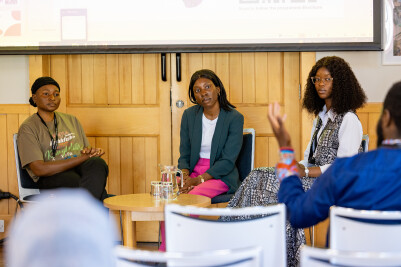
Flash Talk Presenters Hauwa Busari, Favour Chukwudi and Christianah Oseni
The following session focused on education and Onyinye Nkwocha gave a talk on her research into the political economy of education quality reforms in Nigeria and how the different structures with responsibility for education make reforms very challenging. Our final research talk before lunch was from Marie-Ange Camara who has been undertaking participatory research into the power of devised theatre in tertiary education in Cote d’Ivoire and the effects on Teacher-Student relationships. It was evident how much the students had enjoyed this collaborative approach to theatre-making and the impact on their approach to learning.
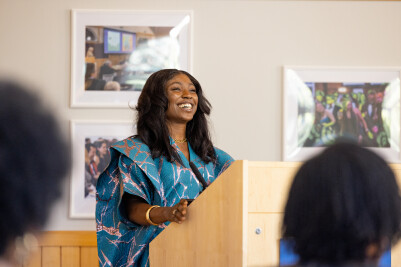
Session Chair Favour Peters bringing her energy to the room
Re-energised after lunch and lots of conversation and a recitation of poetry written and performed by Cambridge scholar Peace Aniakor, we had a session on epidemiology. Abel Walekhwa has been investigating data on cattle movements within Uganda and across its borders and how better monitoring could aid in combatting Rift Valley Fever. This can be a severe disease, primarily affecting livestock but can be transmitted to humans. From Rift Valley Fever to meningitis and Mark Asare described his research on modelling the impact of different vaccination strategies.
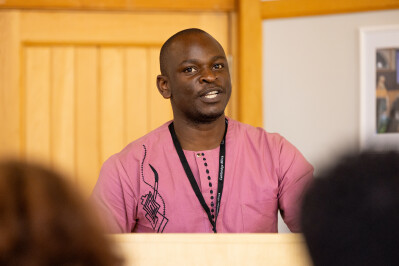 Abel Walekhwa describing cattle movements in Uganda and controlling Rift Valley Fever
Abel Walekhwa describing cattle movements in Uganda and controlling Rift Valley Fever
It was then time for some more flashtalks on mitochondrial proteins, film making about Africa and who told the stories, archaeological investigations into Igbo-Ukwu pottery and the role of smart solar microgrids in rural Africa for powering the local economy. The quality and variety of all the talks kept everyone’s attention and made for riveting sessions. The afternoon session then focused on two very different social enterprises set up by our Cambridge scholars. Parfait Onema, CEO of Tech Power Services, talked about this enterprise’s impact on bringing power to rural DRC via smart microgrids -the initiative is currently being piloted in a village in DRC. Ayikoru Comfort has developed BuriCare, a baby carrier solution, based on kangaroo care. This was developed to reduce deaths among premature babies in Africa and is currently being used in Uganda. Both social enterprises were developed as a result of the founders’ experiences in countries lacking these products.
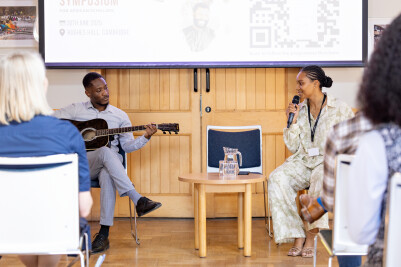
Yaw and Marie-Ange bring their magic to the event
So on to our last session of the day – last but certainly not least as we were entertained with wonderful music by Ngoni Mugwisi who played the beautiful sounding mbira and then Yaw Ansong and Marie-Ange Camara who played the guitar and sang songs from across Africa. The audience was in awe of the talent of all our wonderful performers and they made the symposium extra-special. Our day was rounded off by a wonderful keynote talk by Dr Siyabonga Njica, a historian at Cambridge University, who spoke about Southern African intellectual histories and black transnationalism in academia between Southern Africa and the UK in the twentieth century. We had time for one last part of the packed programme – a panel session on navigating the transition from studies to work. All our panellist provided interesting and varied insights-Tracy Ahzuma the Transitions Coordinator from the Mastercard Foundation Cambridge scholars programme, Mujar Minette Shalo as she concludes her PhD in Cambridge and is facing that transition and our own Adeniyi Emmanuel, skilfully moderated by ASCU President Samuel Agyapong. The day concluded with the awarding of 2 prizes by Professor Sir John Aston, Pro-Vice Chancellor for research, to Saitabu Kumary for the best poster and to Abii-Tah Bih, who was awarded the Dr Amit Bhasin Prize for an Outstanding African scholar in Cambridge. Another blog to follow soon from Abii-Tah about that prize.
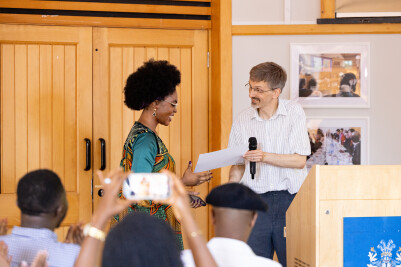 Abii-Tah Bih is presented with the Dr Amit Bhasin prize for an Outstanding African Scholar in Cambridge by Professor Sir John Aston, PVC for research
Abii-Tah Bih is presented with the Dr Amit Bhasin prize for an Outstanding African Scholar in Cambridge by Professor Sir John Aston, PVC for research

